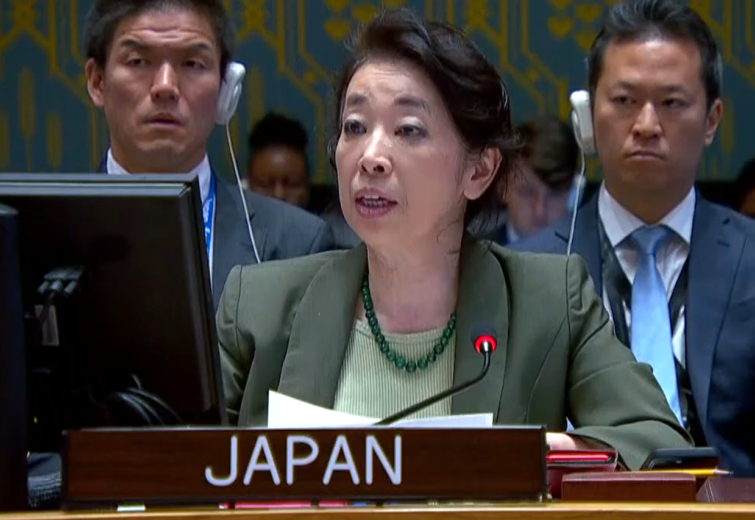国連と地域機関(アラブ連盟)との協力に関する安保理会合における志野大使ステートメント
令和5年6月8日

(As delivered)
Shukran Jaziran (Thank you), Al-Said Al-Rais
Mr. President,
I thank Mr. President His Excellency Khalifa Shaheen, Minister of State, for convening this important meeting. I also thank USG DiCarlo, SG Aboul Gheit, and Dr. Omnia El Omrani for your valuable briefings.
Mr. President,
I recall that last year, under the previous UAE Presidency, the Council adopted a Presidential Statement that welcomed the strong cooperation between the UN and the Arab League and reiterated the Council’s intention to deepen this relationship. Japan welcomes the UAE’s initiative to renew the Council’s consideration of this important topic.
Mr. President,
Prime Minister Kishida visited the Arab League Secretariat in Cairo in April and exchanged views with Secretary-General, His Excellency Mr. Aboul Gheit on regional and international situations and discussed how to strengthen the international order based on the rule of law.
Global challenges are becoming increasingly interrelated, as shown by the Russian aggression against Ukraine, which has impacted not just Europe but the entire world. In many countries including in the Middle East, the soaring food and energy prices have impacted the life of the vulnerable the hardest.
In this time of great geopolitical upheaval, there has never been a better moment to consolidate the UN-Arab League partnership under Chapter VIII of the Charter. In last year’s PRST, the Security Council recognizes the importance of cooperation in areas such as counter-terrorism, poverty eradication, maritime security, conflict prevention, peacekeeping and peacebuilding.
While regional organizations are best equipped to effectively address regional challenges, there are many complex issues that cannot be resolved by such entities alone.
For example, the humanitarian situation in Syria continues to deteriorate, making the upcoming renewal of the cross-border aid mechanism more vital than ever. In the case of Yemen, the UN plays a crucial role in resolving the issue of the FSO Safer off the coast, which could prevent an environmental catastrophe in the Red Sea and beyond.
Mr. President,
Japan will continue to deepen relations with the Arab world. We are committed to the Middle East not only through trade, investment, and energy cooperation, but also by ensuring that the principles of the UN Charter are upheld, including respect for sovereignty and territorial integrity.
Shukran Jaziran (Thank you).
Mr. President,
I thank Mr. President His Excellency Khalifa Shaheen, Minister of State, for convening this important meeting. I also thank USG DiCarlo, SG Aboul Gheit, and Dr. Omnia El Omrani for your valuable briefings.
Mr. President,
I recall that last year, under the previous UAE Presidency, the Council adopted a Presidential Statement that welcomed the strong cooperation between the UN and the Arab League and reiterated the Council’s intention to deepen this relationship. Japan welcomes the UAE’s initiative to renew the Council’s consideration of this important topic.
Mr. President,
Prime Minister Kishida visited the Arab League Secretariat in Cairo in April and exchanged views with Secretary-General, His Excellency Mr. Aboul Gheit on regional and international situations and discussed how to strengthen the international order based on the rule of law.
Global challenges are becoming increasingly interrelated, as shown by the Russian aggression against Ukraine, which has impacted not just Europe but the entire world. In many countries including in the Middle East, the soaring food and energy prices have impacted the life of the vulnerable the hardest.
In this time of great geopolitical upheaval, there has never been a better moment to consolidate the UN-Arab League partnership under Chapter VIII of the Charter. In last year’s PRST, the Security Council recognizes the importance of cooperation in areas such as counter-terrorism, poverty eradication, maritime security, conflict prevention, peacekeeping and peacebuilding.
While regional organizations are best equipped to effectively address regional challenges, there are many complex issues that cannot be resolved by such entities alone.
For example, the humanitarian situation in Syria continues to deteriorate, making the upcoming renewal of the cross-border aid mechanism more vital than ever. In the case of Yemen, the UN plays a crucial role in resolving the issue of the FSO Safer off the coast, which could prevent an environmental catastrophe in the Red Sea and beyond.
Mr. President,
Japan will continue to deepen relations with the Arab world. We are committed to the Middle East not only through trade, investment, and energy cooperation, but also by ensuring that the principles of the UN Charter are upheld, including respect for sovereignty and territorial integrity.
Shukran Jaziran (Thank you).
